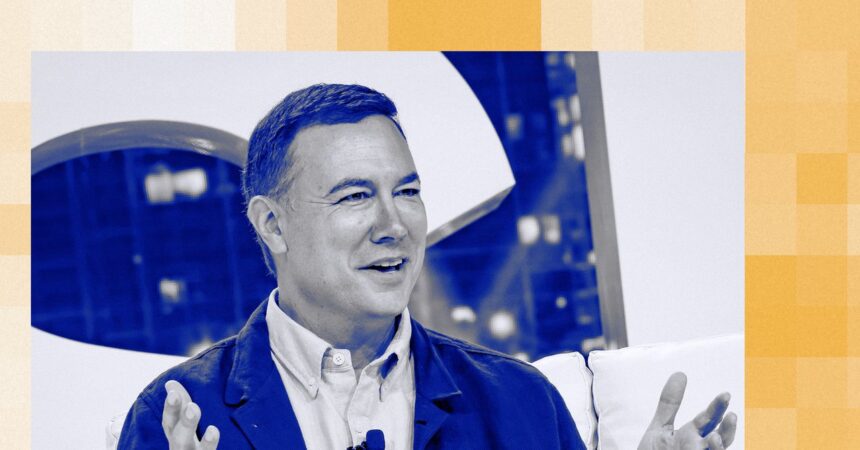In September 2021, Jim Lanzone stepped into the leadership of a company that once epitomized the vibrant spirit of the internet but had, over the years, become a punchline: Yahoo. He took on the role of CEO after the company was acquired by private-equity firm Apollo Global Management, who purchased it from Verizon, the latest and possibly most oblivious steward in a long history of management shifts. During a visit to the company’s offices in New York City, I asked Lanzone what inspired him to take the job. “I thrive on turnarounds,” he responded.
Lanzone’s track record supports his statement. Back in 2001, he took the helm of a struggling search engine known as AskJeeves—its share price had plummeted to less than a dollar from a peak of $196—and transformed it, ultimately leading to its acquisition by Barry Diller’s IAC Corp for $1.85 billion. At CBS Interactive, and later as CBS’s chief digital officer throughout the 2010s, he modernized the once-staid Tiffany network by ushering it into the streaming era. Yahoo, which is celebrating its 30th anniversary this month, may present his biggest challenge to date. The company’s history is marked by a series of missed opportunities, which partly explains how a public company once valued at over $100 billion sold for $5 billion in 2021 to a private equity firm. Yahoo notoriously chose not to acquire Google, and it even had Mark Zuckerberg tentatively agree to sell Facebook for $1 billion before then-CEO Terry Semel sought to renegotiate, ultimately killing the deal. Notable talent that departed from Yahoo includes the founders of WhatsApp. Promising acquisitions like Flickr, Tumblr, and the Huffington Post were let go at bargain-basement prices. In more recent years, Yahoo became a low-priority asset under Verizon, which instead of attempting to revive its purple prestige, merged Yahoo’s elements with AOL, creating the rebranded Oath.
Many observers placed Lanzone’s odds of success at zero. “It’s hard to fathom that anyone else on earth would want any part of this role,” remarked George Bradt, one of those business experts who produces articles for Forbes. Lanzone had a distinctly different perspective. He viewed Yahoo as an undervalued treasure. “If you stripped the name Yahoo away and evaluated the business in 2021, you would see billions in revenue,” he stated.
Lanzone has little interest in rehashing the company’s historical missteps. “The narrative surrounding Yahoo’s missed chances is stale,” he said. “It’s boring.” Refusing to dwell on lost potential, Lanzone focused on enhancing Yahoo’s current offerings. “We didn’t need to obsess over what we weren’t,” he explained. He eliminated unprofitable segments, such as some underperforming ad tech divisions, and discreetly executed acquisitions to strengthen top-performing properties, including Wagr, a sports betting app that modernized Yahoo Sports for the gambling era. He also recruited skilled executives like former ESPN digital head Ryan Spoon, who now leads Yahoo Sports. Lanzone has increased profits and expanded the company’s audience, claiming that Yahoo experienced the quickest financial recovery of any acquisition by Apollo. Since Yahoo is privately held, the specific financial details are not publicly disclosed, but Yahoo’s communications team offered a comprehensive document filled with metrics to support Lanzone’s assertion that the company still has a significant presence. A marketing firm named Comscore ranks Yahoo as No. 1 in news, No. 1 in finance, and No. 3 in sports, while it comes second only to Gmail in email services. “Hundreds of millions” of people in the U.S. engage with Yahoo each month, he stated.
A year into Lanzone’s tenure, the entire tech landscape was upended by the launch of ChatGPT. Historically, Yahoo has nearly flawless success in failing to capitalize on transformative moments like search, social media, and mobile. Lanzone asserts that although Yahoo won’t develop its own language models or invest $100 billion in data centers, the company will still take advantage of the current moment. “I’d like to automate the very mention of ‘AI’ so I don’t need to say it so often,” he joked. Yahoo has its in-house machine-learning team and collaborates with external firms for AI technologies. For example, it partners with the startup Sierra for robotic customer service agents.
One of Lanzone’s astute moves regarding AI was acquiring Artifact, the AI-driven news aggregator created by Instagram co-founders Kevin Systrom and Mike Krieger. When they decided it wouldn’t evolve into a sustainable business, they announced its closure, leaving Lanzone among several candidates vying for the underlying technology. This acquisition became the cornerstone of the homepage Yahoo revamped earlier this year. “Rather than integrating their tech into our product, we inverted that approach,” Lanzone stated. “Essentially Yahoo News has now transformed into Artifact.” Systrom expressed his approval: “We partnered with Yahoo because they presented a compelling offer, but also due to their plan to expose our innovations to millions of users.”










